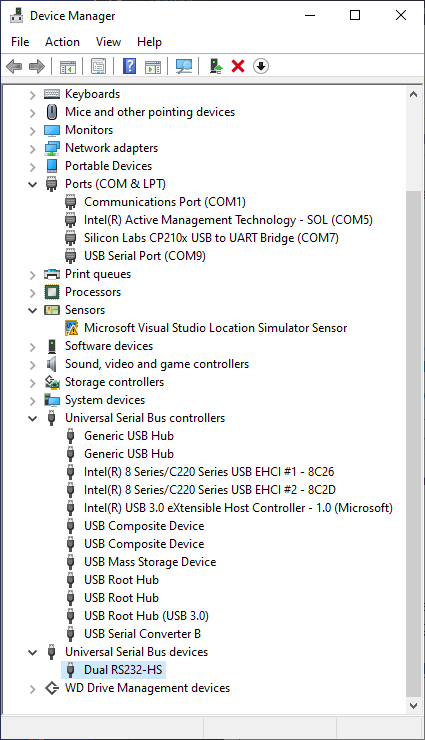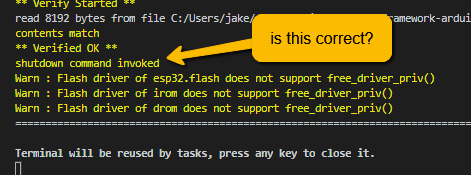I looked at all the posts on this forum concerning esp-prog/esp32. Also explored several other youbube vids.
I followed the youtube vid:
Use the PIO Debugger on the ESP32 uing the esp-prog by Brian Lough.
I’m using ESP-WROOM-32 with the esp-prog (FT2232HL).
I installed FTDI and Zadig and verified all was fine in the DevMgr.
I connect 2 USB cables, 1 to esp32 (COM7) the other to esp-prog(COM9)
The PIO.ini file is:
[env:esp32dev]
platform = espressif32
board = esp32dev
framework = arduino
;upload_port = COM9
;build_type = debug
debug_tool = esp-prog
debug_init_break = tbreak setup
The blink code builds successfully but won’t upload.
The following is the upload file:
Processing esp32dev (platform: espressif32; board: esp32dev; framework: arduino)
----------------------------------------------------------------------------------------------------------------------------------------------------------------------------------------------------------------------------------------------------------------Verbose mode can be enabled via `-v, --verbose` option
CONFIGURATION: https://docs.platformio.org/page/boards/espressif32/esp32dev.html
PLATFORM: Espressif 32 (1.11.2) > Espressif ESP32 Dev Module
HARDWARE: ESP32 240MHz, 320KB RAM, 4MB Flash
DEBUG: Current (esp-prog) External (esp-prog, iot-bus-jtag, jlink, minimodule, olimex-arm-usb-ocd, olimex-arm-usb-ocd-h, olimex-arm-usb-tiny-h, olimex-jtag-tiny, tumpa)
PACKAGES:
- framework-arduinoespressif32 3.10004.200129 (1.0.4)
- tool-esptoolpy 1.20600.0 (2.6.0)
- tool-mkspiffs 2.230.0 (2.30)
- toolchain-xtensa32 2.50200.80 (5.2.0)
LDF: Library Dependency Finder -> http://bit.ly/configure-pio-ldf
LDF Modes: Finder ~ chain, Compatibility ~ soft
Found 29 compatible libraries
Scanning dependencies...
No dependencies
Building in debug mode
Retrieving maximum program size .pio\build\esp32dev\firmware.elf
Checking size .pio\build\esp32dev\firmware.elf
Advanced Memory Usage is available via "PlatformIO Home > Project Inspect"
RAM: [ ] 4.7% (used 15356 bytes from 327680 bytes)
Flash: [== ] 16.1% (used 211029 bytes from 1310720 bytes)
Configuring upload protocol...
AVAILABLE: esp-prog, espota, esptool, iot-bus-jtag, jlink, minimodule, olimex-arm-usb-ocd, olimex-arm-usb-ocd-h, olimex-arm-usb-tiny-h, olimex-jtag-tiny, tumpa
CURRENT: upload_protocol = esptool
Looking for upload port...
Auto-detected: COM9
Uploading .pio\build\esp32dev\firmware.bin
esptool.py v2.6
Serial port COM9
Connecting........_____....._____....._____....._____....._____....._____....._____
A fatal error occurred: Failed to connect to ESP32: Timed out waiting for packet header
*** [upload] Error 2
================================================================================================================= [FAILED] Took 28.37 seconds =================================================================================================================
The terminal process "C:\Users\jake\.platformio\penv\Scripts\platformio.exe 'run', '--target', 'upload'" terminated with exit code: 1.
Terminal will be reused by tasks, press any key to close it.
=======================================================================
Concerns:
- From what I’ve gleaned from other posts is that one of the USB connections can be removed but I’m not sure which to remove. I tried and got weird output.
- If I remove esp-prog board COM9 do I have to power board via 3v3?



